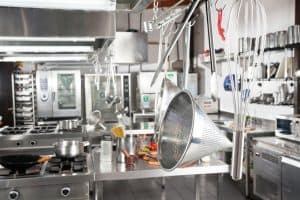
How data and artificial intelligence are ready to revolutionize the restaurant kitchen.
While smart appliances such as fridges, ovens, and grills offer restaurants a host of new advantages, from energy efficiencies to accurate stock counts, equipment still needs to be serviced to keep food on the tables. Smart Care Equipment Solutions, the largest independent provider of commercial equipment repair in the U.S., keeps food service organizations across the nation operating. As more food service organizations seek important availability and reliability, kitchen equipment as-a-service is rising, and data-driven insights and technologies are at the heart of the transition.
“Connected kitchens,” when embraced, can help organizations maximize their appliances, with further benefits to be realized when disruptive technologies such as the Internet of Things (IoT)and artificial intelligence (AI) are also integrated.
Transforming commercial culinary with computing
With smart appliances becoming commonplace in kitchens across the world, Smart Care connects these independent devices into one centralized hub, so essentially, a chef, restaurateur, or owner can access new insights to their appliances right in their kitchen.
Currently, over 40,000 establishments in all but eight U.S. states utilize Smart Care to keep their restaurants operating smoothly. Smart Care allows all smart appliances, from dishwashers and refrigerators to cookers and steamers, to be serviced or fixed quickly and hassle-free by one of over 800 Smart Care technicians.
A recent report published by the International Journal of Contemporary Hospitality Management argues that Smart Care is definitely a business in the right place at the right time. The report states that “data-driven decision-making, supply chain management, and preventive maintenance will, among others, leverage specific operational process theories and increase the likelihood of a competitive advantage through innovation across the various sectors of the hospitality industry.”
Scalable service made possible with transformative technology
Gyner Ozgul, COO at Smart Care, and the Smart Care team realized that it was necessary to invest in modern technology to propel the company towards reaching its vision as well as addressing the evolution in customer expectations and the opportunities to better optimize resources. “We needed technology that would help us build a better Moment of ServiceTM for our customers and their end-customers. From an end-user perspective, I call it the Amazon mentality, or consumerization. It’s this whole expectation and timing of service delivery, great communication, and constant communication flow, but also things like information on the equipment you’re working on and accessibility of work order management systems,” explains Ozgul. “Positive impact on the customer experience was first and foremost for us.”
Smart Care began its search for more modern technology with clarity on three primary objectives. It was important that the tech would deliver a more modern and consistent customer experience, improve optimization of Smart Care’s resources, and enable the company to scale service delivery as it grows both organically and through acquisition.
Letting AI trim fat and cut costs
AI has been a key success factor in meeting increasing customer demands. Smart Care was looking to drive automation into everyday operations, and now it also utilizes AI to help technicians with part identification and equipment diagnostics.
As a result, Smart Care service offerings have expanded beyond traditional reactive break-fix repair. Smart Care also sells annual maintenance contracts that require proactive planning and management to ensure resources are available when needed and that plans are priced to be both competitive and viable.
Future-proofing the kitchen of the future with data-driven insight
With its investment in modern technology, Smart Care has set the stage for its journey to differentiation through data. In time, more kitchen equipment will include IoT sensors that can drive intelligent maintenance. Equipment design will increasingly incorporate smart functionality, which will allow it to self-monitor and report proactively on a variety of custom data points from the performance of parts, warranty expirations, and advance notice of needed service and repair. Factory-trained technicians will be able to use the data to not only effectively repair the equipment to operating standards but also to gain insight into the causes of the failure and how it can be prevented in the future.
Smart Care focuses on evolution via continuous improvement. This includes piloting new techniques and technologies both within and in tangent with its existing software.





